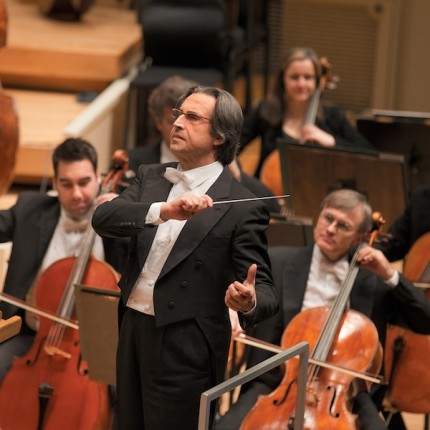Vibrant Beethoven highlights Muti’s final CSO program of year
Riccardo Muti returned for a rare one-week stand with the Chicago Symphony Orchestra Thursday night, his final program of the year. If the Russian-Beethoven lineup stayed largely within the music director’s fixed parameters, the concert also showed the integrity and vitality of this musical partnership at its best.
The evening led off with Prokofiev’s “Classical” symphony (No. 1). Muti led a characteristically refined and bracing performance—incisive and acutely balanced with dynamics clearly marked, and transparent textures. What was lacking–surprisingly–was the subversive wit, with even the Gavotte more tautly literal than charming. The finale came off best, fleet and dynamic with the chattering woodwinds lending lively counterpoint.
Frederick Stock and the CSO gave the American premiere of Scriabin’s Prometheus, The Poem of Fire exactly a century ago, and its inclusion on the program marked another nod to works premiered by the orchestra in this 125th anniversary season, as well as providing a pendant to Muti’s Scriabin cycle of last season.
In this late work, Scriabin attempts to fuse his chromatic musical style with an increasingly grandiose philosophical vision in a sprawling canvas for solo piano, huge orchestra and chorus. Though it has the virtue of brevity at just 20 minutes, Prometheus is not among Scriabin’s more successful works–neither a convincing concerto nor symphony, and with surging religio-ecstatic waves which he’s written before to better effect. When the wordless chorus enters in the final bars with its “Oh, oh-ing,” Prometheus moves into the realm of high camp.
The alarmingly gifted Kirill Gerstein proved a simpatico solo protagonist for Scriabin’s wayward quasi-concerto, bringing power, firm focus, and unbridled virtuosity to the rhapsodic keyboard role.
As in previous Scriabin performances, Muti’s tempered approach shears off some of the composer’s sonic excess to concentrate on form, rhythmic flow and nuances of scoring and colors. At times one wanted a bit more overkill to compensate for Scriabin’s moments of meandering, but under Muti the orchestra offered typically refined and committed performance with the CSO Chorus contributing atmospheric vocalise in the final section.
The second half offered no such discoveries, serving mainly to plug the few remaining gaps in Muti’s local Beethoven scorecard, yet it also delivered the high point of the evening.
Beethoven’s music has provided some of Muti’s most rewarding and consistent nights and so it proved again with a notably fresh and vibrant performance of the Symphony No. 8.
There was no sense of the Eighth as one of Beethoven’s “little” symphonies, with Muti and the orchestra giving full-blooded commitment and focus to this charming music. The first movement launched at a crackling pace–“con brio” as marked yet without sacrificing an essential genial spirit, Muti and the players putting across the vivacious humor and rhythmic ingenuity.
In the Allegretto Beethoven’s witty riff on the tick-tock of the newly invented metronome was deftly turned and the ensuing Menuetto aptly gracious with elegant horn playing from Daniel Gingrich and James Smelser set again Stephen Williamson’s noodling clarinet.
The finale showed this partnership at its peak–buoyant and fizzingly energized with Muti and company throwing off Beethoven’s rhythmic and harmonic curveballs with witty and delightful impact.
Muti preceded the symphony with a stormy and dramatic account of Beethoven’s Coriolan Overture, with aggressively punched out chords and pounding timpani.
The program will be repeated 1:30 p.m. Friday and 8 p.m. Saturday. cso.org; 312-294-3000.
Posted in Performances



